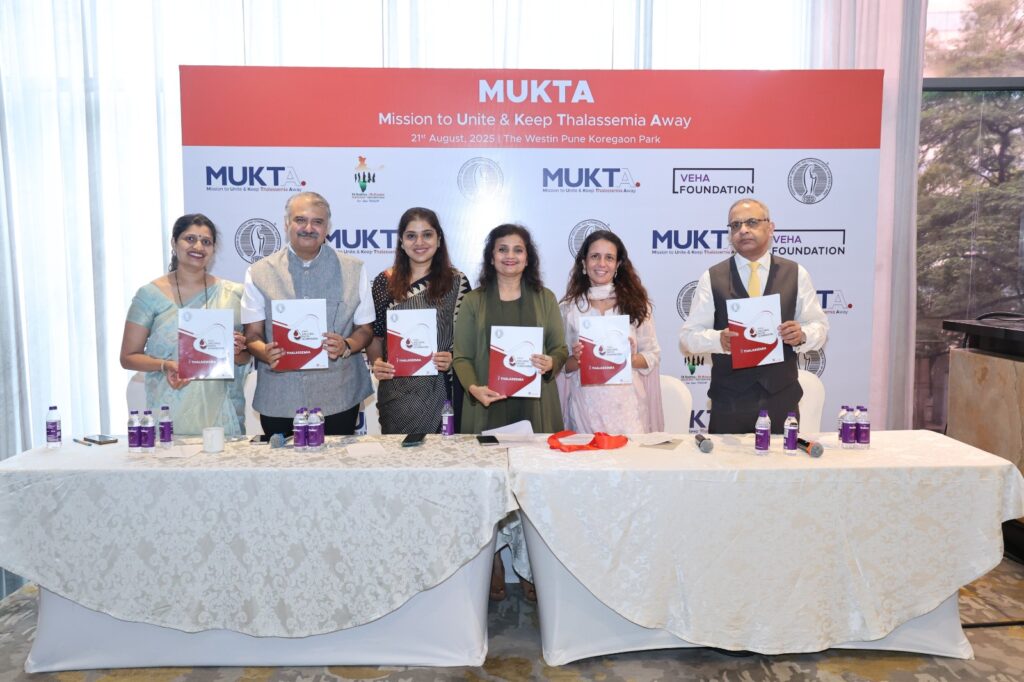Nationwide Thalassemia Prevention Drive Launched In Pune

Nationwide Thalassemia Prevention Drive Launched In Pune
Pune, August 22, 2025: India is the Thalassemia capital of the world, with the highest number of children affected by Thalassemia Major. It is estimated that 1,00,000 to 1,50,000 children in India are living with the disease, and each year 10,000 to 15,000 babies are born with Thalassemia Major. Further, around 42 million Indians carry the β-Thalassemia trait, putting millions of families at risk.
Given these challenges, prevention through early identification of carriers and at-risk couples is the most effective strategy to reduce disease incidence.
To address this, the Federation of Obstetric and Gynaecological Societies of India (FOGSI) and Veha Foundation today launched the Good Clinical Practice Recommendations (GCPR) for universal antenatal Thalassemia screening, prevention, and diagnosis in India. These guidelines were unveiled as part of Project MUKTA (Mission to Unite and Keep Thalassemia Away), a nationwide initiative to make Thalassemia screening a routine component of antenatal care.
The guidelines were unveiled in Pune by Dr. Sunita Tandulwadkar, President of FOGSI, along with Dr. Jaydeep Tank, Immediate Past President of FOGSI, Rumana Hamied, Director of Veha Foundation, and Dr. Pooja Lodha, National Convenor, Project MUKTA. The initiative forms a core part of Project MUKTA, a nationwide program designed to make Thalassemia screening a routine part of antenatal care.
Speaking at the launch, Dr. Sunita Tandulwadkar, President of FOGSI, said “The word MUKTA means ‘liberated,’ and that’s what we’re striving for—a future where no child has to suffer from a condition we have the power to prevent.”
The new guidelines recommend that every untested woman should undergo a simple blood test called HPLC to screen for Thalassemia within the first three months of pregnancy. If both partners are found to be carriers, doctors can provide early counseling and further testing to help prevent the birth of an affected child.
Highlighting the urgency of action, Dr. Jaydeep Tank, Immediate Past President of FOGSI, noted:
“Thalassemia is a preventable condition, yet many families in India are unaware of the risk until it is too late. A simple screening test can identify carriers, allowing couples to make informed decisions and prevent the disease from being passed on to their children.”
With the rollout of Project MUKTA, the initiative aims to begin in 10 cities by the end of 2025, conducting continuing medical education (CME) sessions for doctors. Over time, it intends to scale up to 30+ cities, integrate awareness campaigns, and host sessions at national conferences.
Dr. Suvarna Khadilkar, Secretary General of FOGSI, emphasized the broader impact, saying:
“Project MUKTA is a landmark initiative that will help reduce the prevalence of Thalassemia across the country, with a focused effort in areas with high prevalence.”
The project will also collaborate with medical colleges, diagnostic centers, and professional associations to build a strong network for prevention. As Rumana Hamied, Director of Veha Foundation, explained:
“Behind every statistic is a life, a child, and a family. Our goal is not just to raise awareness, but to drive tangible action that liberates future generations from a preventable condition.”
To ensure effective implementation, Project MUKTA will begin by training 70–80 doctors as master trainers who will work directly with doctors, facilities, and communities across India. Dr. Pooja Lodha, National Convenor, Project MUKTA, added:
“These guidelines will form an important technical base for the project. By empowering doctors at the grassroots, we can ensure early detection and prevention become a natural part of antenatal care.”









